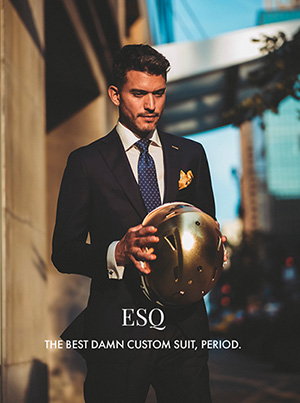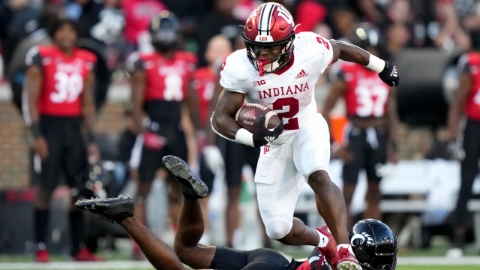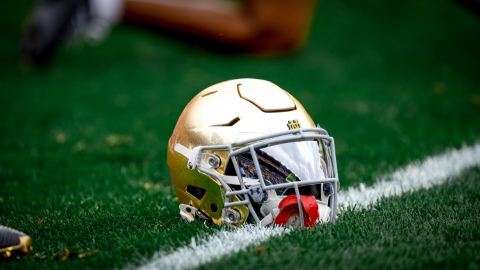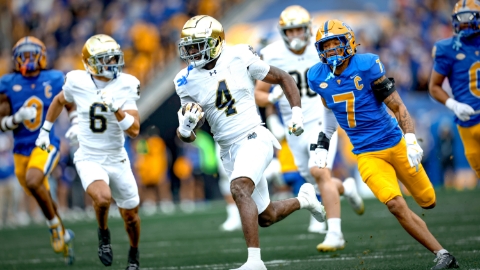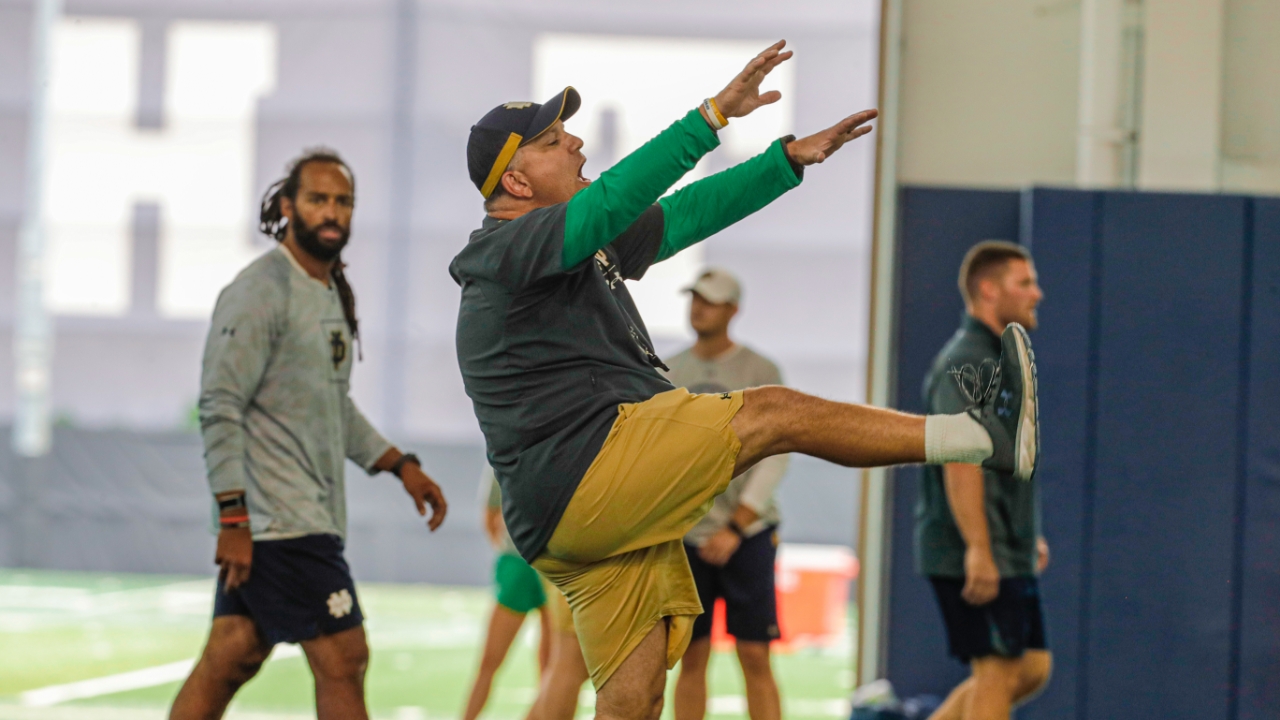
Notre Dame strength and conditioning guru Matt Balis met with members of print media Thursday afternoon and conducted an informal, 15-plus minute question-and-answer session with reporters.
Balis’ Q-A is below, including some fascinating insight into the transition from Brian Kelly to Marcus Freeman and Balis’ own personal training philosphies, which are now front-and-center in the Irish’s offseason program before the onset of spring camp in two weeks.
Q: You discuss building culture through strength and conditioning but there’s also mental elements. How do you go about building a culture, mentally and physically?
MB: To me it starts with the student-athletes, the players themselves and who they are. At a place like Notre Dame, the culture is kind of just set in the fact of what Notre Dame’s about and what the guys are about. So you already have this advantage, so to speak. Once you have this kind of place and these kinds of players, the culture basically creates itself. Now how do we do that? How do we help it? Those are things like competition, leadership. That’s the mental and physical toughness, the emotional strength to put together hard workouts day after day after day.
Because it’s not just one workout, like anything else. It’s the ability to be consistent. The mental aspect of it is what does it look like on Day 1, yeah everybody’s feeling great on Day 1, but what does it look like on Day 30 and Day 50 and Day 60. You never stay the same. You either get better or you get worse. Part of the culture is that, the mental makeup of what’s going through your mind. Is it just a training or is it, ‘Hey, it’s an attacking mentality.’ Through all these different venues that we have in our competitive teams, and with coach Freeman’s The Golden Standard vision, we can challenge everything. We’re developing our unit strength, we’re having competitive spirit in everything we’re doing. So it all kind of meshes together daily with those players.
Q: What has Coach Freeman tweaked as it relates to your program and what you’re doing with the guys in offseason workouts?
MB: You know, it’s been awesome. Him and I, there are some similarities in background and where we’ve come up with. It’s been great with the expectations that he has for me and the strength staff that he’s entrusted us to be able to do the job that we’re charged to do. That excitement, that energy, it’s about hard work and preparation but also making it fun. And it’s been fun, it’s been a great offseason because we’ve worked hard but it’s been fun as well.
Q: What were priorities as you met with Marcus and headed into this offseason workouts?
MB: It’s about priorities, it’s about that ‘Golden Standard.’ It’s about preparation. You can’t fake that, you can’t all of a sudden say, ‘Hey, I’m going to revert back to my training’ if we haven’t put the work in. So his thing is, we’ve got to pay the price now and immediately. So daily, how are the guys, what’s happening, and he’s there all the time as well, which has been awesome.
I think that’s where it starts; preparation, accountability, players getting closer and closer together, building that team camaraderie, and that takes time.
Q: What’s the impact when a head coach is at all the workouts?
MB: It’s awesome. He’s there, he’s working out himself, showing his ability to, the importance of being healthy and staying in shape and being around the guys and seeing them train, it’s absolutely awesome.
Q: What was your relationship like with Marcus for the 11 months before he was head coach, and what did you see in that time that let you know, ‘Hey, I could work for this guy as my head coach’?
MB: Very great with the players. Great to work with, with myself, and the interactions I had with him as he was the DC and discussing our players. Just talking philosophies in terms of strength training and getting guys ready to play.
But I just saw tireless worker, unbelievable work ethic, tons of energy. And just for sure a future head coach. You’re like, ‘Yeah, this guy is going to be a future star. Immediately.’ But the working the relationship was awesome, from the get-go.
Q: It’s been 3 months since the transition, but what was that time like for you? It’s fairly unprecedented for an A.D. to come say, ‘No matter who my coach is, you’re going to be my strength coach.’?
MB: A blessing. Humbling. The opportunity to work at a place like this, I’ve always said, is incredible. And to get to work with the student-athletes that we get to work with is the best. And then for Jack to say that and allow me to continue to be a part of this, was awesome. Was incredibly humbling, like I said, and a dream come true for my family.
Q: Worked different places, so what differentiates a student-athlete at Notre Dame?
MB: Everywhere you’re at, it’s always about your players, your kids. But I feel like here, we just have kids that want to be the best in every facet of their life, every day, all day. It’s the highest level of work ethic, service, doing the right thing, wanting to play at the next level, but also understanding how to be a great person. To be great men, to be great stewards of what Notre Dame represents.
Q: How long ago were you an elementary school teacher and how did it turn into this?
MB: 1996-2000, so 22 years ago. I always trained, loved training, started training at 12. Had a weight set at home, and trained for football, competed in power-lifting, but as a teacher, trained the high schools that I was around in Wheaton. Couple mentors of mine, one went on to be a college strength coach, the other had coached in college and said you really should think about doing this in college. So I did, started really thinking about it and giving it real thought and that’s what kind of led to this whole odyssey of all the places I’ve been. But it was the love and passion of training and mentors, great men in my life who put it out there and said you should really do this or look at trying to do this.
Coach Matt Foster, he was the head coach most recently at the college of DuPage. Probably the biggest mentor in my life. Guy by the name of Scott Keller, who was also at the College of DuPage as a strength coach there years ago. He ended up going to the University of Houston, which is where I got my first internship with him. He’s the one who kind of got me in, so those two guys in particular.
Q: What did you learn about doing this job that first year at Houston, when you didn’t win a game, but then the next year it spiked up in wins?
MB: It just started from the high school days, we believed with Coach Foster that we wanted to train those kids like a college program, we wanted to challenge them. He wanted me to go out and see the best strength coaches in the country and learn what the colleges were doing. We trained early in the morning and started setting the culture for those high schools back in the late-90s, and we saw it work. He ended up having back to back semifinalist appearances, the guy I worked for at Wheaton North, Houston ended up turning it around, never had a losing season again I don’t think. You just kept seeing it continue to work. It was just old-school principles, nothing magical. Preparation, hard work, competing, being consistent.
Q: How have you had to adapt your offseason program with so many early enrollees? Does that change how you approach or what you can do?
MB: Maybe at first, but now it’s kind of the norm. You have different levels of workouts, obviously for freshmen coming in, you’re always very careful. You’ve got to be smart in terms of not doing too much too fast. These are some of the best of the best of the best in America. So they’re here for a reason, so we really want to take our time and teach them how to work out, understand, let them understand what the program is about. Because there’s movement patterns that have to be learned. There’s physiological systems that have to take place, that have to understand why they’re doing what they’re doing and what they’re doing and what it does. And then, you can’t make jumps too fast. You have to be very progressive in nature. There can’t be these big spikes. As long as you do that, you’re OK.
In that instance, we’ve kind of got a nice system for it now, where it’s the norm.
Q: Why are morning workouts better?
MB: I don’t know that they’re better; they certainly require a sacrifice in terms of when you’re going to go to bed, how you’re going to create your day, your routine. There’s research out there that says training later is better, too.
I don’t think that this is the absolute best way to do it, but for us and what we have now in terms of the schedule, it’s a great way to, like I said what we did years ago, that sacrifice that you have to make to get up early and go and work hard and be at your absolute best, even when you don’t feel like it.
Q: How were you able to help Blake Fisher be able to play in the Fiesta Bowl, not only to just play but play at a high level and sustain it for the game?
MB: Well, first off, he’s a genetic phenom, right? HE’s as talented of a guy as there is. And then he’s a very, very hard worker. The combination of those two, that right there equals unbelievable success. Hard worker plus unbelievable genetics, look out.
And then we were just able to, with our sports med staff, Rob Hunt and his staff doing a great job, nutrition-wise, he did a great job of being disciplined. The training around his injury but making sure he still stayed in shape, all those things played into it. It was a great team effort. Starts with him, his mindset, he never, when you get injured, you can lose your mindset, get injured, he was able to keep that going and kept his eye focused and on the target, so to speak.
And when it was time to play, he was able to do it.
Q: What was the process like when they asked you to be the one to reveal to the team that Marcus Freeman had been named head coach?
MB: Humbled. Very humbled. Awesome. You feel proud and just lucky to be a part of it. It was just something like I said, you love the place, you love the kids. Just honored. I can’t put it any other way. The chance to be a part of something really awesome. I think Katy (Lonergan) might have been the one that put it all together. It was really great.
Q: Any new guys on the starving part of the board?
MB: It’s hard to do, when you’re just starting just because you just haven’t put in all the time yet. Training really is about putting back to back to back quality workouts over and over again. And so, it’s hard for those guys.
Q: How has the SWAT culture evolved through the years?
MB: I think it’s just going back to the type of kids that we get here, they’re awesome. They’re leaders and they want to be involved in all the different things that we try to do within that SWAT program. The competing in every aspect, the competitive spirit that Coach Freeman talks about. Embracing the Notre Dame culture, embracing the community service opportunities, going to the student body, other games and being part of the student body. All those things are part of the fabric of Notre Dame. I feel like what you’re asking, it evolves because it’s kind of built-in anyway.
Q: Did you bring the SWAT concept here?
MB: I’ve always believed in competing and teams competing. We’ve always had systems that started out years ago, and I didn’t start it. It was probably started by other people, but we would just do some weight room things and maybe speed and maybe agilities. We started bringing in the academic portion and then we started bringing in all the other things that classifies as the discipline pieces. It’s just kind of evolved over time, and it feels like it’s in its perfect place.
Q: Do you identify the leaders or do the leaders reveal themselves to you?
MB: It’s all different, right? The head football coach, he’s going to say, ‘Here are some guys that I think can be and should be leaders.’ So really what this is is more of a trial process. They’re kind of going through, we’re getting to see how they do and to try to help them and teach them and have them learn how to be leaders. It’s kind of a combination of our head coach and as a strength staff, we’ll talk about it as well.
Q: How has technology allowed you to more safely push the guys to find their optimal levels, such as wearable heart monitors, GPS, etc.?
MB: It’s never going to change in terms of, in my belief, hard work, old school training, you have to work hard, you have to stress the body, but the science allows us to see what we’re doing and it keeps us in the right spaces, so to speak. It won’t allow you to go too hard, you’ll know it. You’ll know it if you’re not going hard enough.
